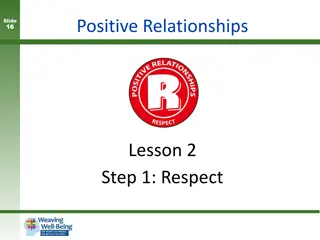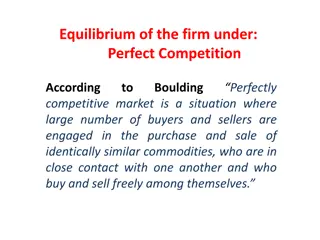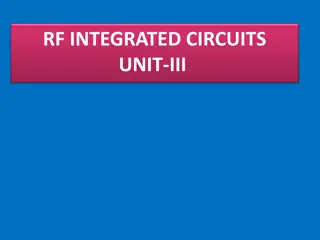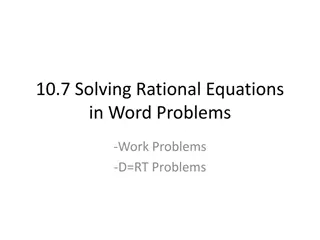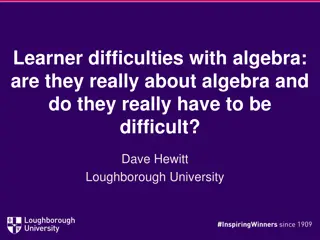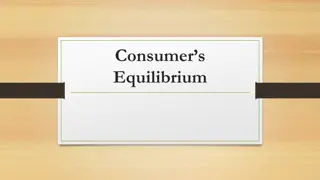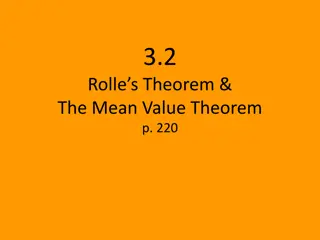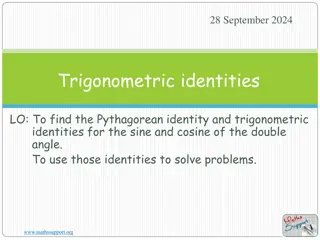
Understanding Object Equality: Java Insights
Explore the concepts of object equality in Java programming, including the nuances of reference and value equality, the importance of the equals method, and the implications for class design and overriding. Gain a deeper understanding of when objects are considered equal and how to implement equality efficiently.
Download Presentation

Please find below an Image/Link to download the presentation.
The content on the website is provided AS IS for your information and personal use only. It may not be sold, licensed, or shared on other websites without obtaining consent from the author. If you encounter any issues during the download, it is possible that the publisher has removed the file from their server.
You are allowed to download the files provided on this website for personal or commercial use, subject to the condition that they are used lawfully. All files are the property of their respective owners.
The content on the website is provided AS IS for your information and personal use only. It may not be sold, licensed, or shared on other websites without obtaining consent from the author.
E N D
Presentation Transcript
CSE 331 Software Design & Implementation Dan Grossman Spring 2015 Identity, equals, and hashCode (Based on slides by Mike Ernst, Dan Grossman, David Notkin, Hal Perkins)
Object equality A simple idea?? Two objects are equal if they have the same value A subtle idea: intuition can be misleading Same object or same contents? Same concrete value or same abstract value? Same right now or same forever? Same for instances of this class or also for subclasses? When are two collections equal? How related to equality of elements? Order of elements? What if a collection contains itself? How can we implement equality efficiently? CSE331 Spring 2015 2
Expected properties of equality Reflexive Confusing if an object does not equal itself a.equals(a) == true a.equals(b) b.equals(a) Symmetric Confusing if order-of-arguments matters a.equals(b) b.equals(c) a.equals(c) Transitive Confusing again to violate centuries of logical reasoning A relation that is reflexive, transitive, and symmetric is an equivalence relation CSE331 Spring 2015 3
Reference equality Reference equality means an object is equal only to itself a == b only if a and b refer to (point to) the same object Reference equality is an equivalence relation Reflexive Symmetric Transitive Reference equality is the smallest equivalence relation on objects Hardest to show two objects are equal (must be same object) Cannot be smaller without violating reflexivity Sometimes but not always what we want CSE331 Spring 2015 4
What might we want? Date d1 = new Date(12,27,2013); Date d2 = new Date(12,27,2013); Date d3 = d2; // d1==d2 ? // d2==d3 ? // d1.equals(d2) ? // d2.equals(d3) ? d1 d2 d3 12 month 27 day 2013 year 12 month 27 day 2013 year Sometimes want equivalence relation bigger than == Java takes OOP approach of letting classes overrideequals CSE331 Spring 2015 5
Object.equals method public class Object { public boolean equals(Object o) { return this == o; } } Implements reference equality Subclasses can override to implement a different equality But library includes a contractequals should satisfy Reference equality satisfies it So should any overriding implementation Balances flexibility in notion-implemented and what-clients- can-assume even in presence of overriding CSE331 Spring 2015 6
equals specification public boolean equals(Object obj) Indicates whether some other object is equal to this one. The equals method implements an equivalence relation: It is reflexive: for any reference value x, x.equals(x) should return true. It is symmetric: for any reference values x and y, x.equals(y) should return true if and only if y.equals(x) returns true. It is transitive: for any reference values x, y, and z, if x.equals(y) returns true and y.equals(z) returns true, then x.equals(z) should return true. It is consistent: for any reference values x and y, multiple invocations of x.equals(y) consistently return true or consistently return false, provided no information used in equals comparisons on the object is modified. For any non-null reference value x, x.equals(null) should return false. CSE331 Spring 2015 7
Why all this? Remember the goal is a contract: Weak enough to allow different useful overrides Strong enough so clients can assume equal-ish things Example: To implement a set Complete enough for real software So: Equivalence relation Consistency, but allow for mutation to change the answer Asymmetric with null (other way raises exception) Final detail: argument of null must return false CSE331 Spring 2015 8
An example A class where we may want equals to mean equal contents public class Duration { private final int min; // RI: min>=0 private final int sec; // RI: 0<=sec<60 public Duration(int min, int sec) { assert min>=0 && sec>=0 && sec<60; this.min = min; this.sec = sec; } } Should be able to implement what we want and satisfy the equalscontract CSE331 Spring 2015 9
How about this? public class Duration { public boolean equals(Duration d) { return this.min==d.min && this.sec==d.sec; } } Two bugs: 1. Violates contract for null (not that interesting) Can add if(d==null) return false; But our fix for the other bug will make this unnecessary 2. Does not override Object s equals method (more interesting) CSE331 Spring 2015 10
Overloading versus overriding In Java: A class can have multiple methods with the same name and different parameters (number or type) A method overrides a superclass method only if it has the same name and exact same argument types So Duration s boolean equals(Duration d) does not override Object s boolean equals(Object d) Sometimes useful to avoid having to make up different method names Sometimes confusing since the rules for what-method-gets- called are complicated [Overriding covered in CSE143, but not overloading] CSE331 Spring 2015 11
Example: no overriding public class Duration { public boolean equals(Duration d) { } } Duration d1 = new Duration(10,5); Duration d2 = new Duration(10,5); Object o1 = d1; Object o2 = d2; d1.equals(d2); // true o1.equals(o2); // false (!) d1.equals(o2); // false (!) o1.equals(d2); // false (!) d1.equals(o1); // true [using Object s equals] CSE331 Spring 2015 12
Example fixed (mostly) public class Duration { public boolean equals(Object d) { } } Duration d1 = new Duration(10,5); Duration d2 = new Duration(10,5); Object o1 = d1; Object o2 = d2; d1.equals(d2); // true o1.equals(o2); // true [overriding] d1.equals(o2); // true [overriding] o1.equals(d2); // true [overriding] d1.equals(o1); // true [overriding] CSE331 Spring 2015 13
A little more generally Won t go through all the overloading-resolution rules here In short, Java: Uses (compile-time) types to pick the signature (at compile- time) In example: if receiver or argument has compile-time type Object, then only signature taking an Object is known to work, so it is picked At run-time, uses dynamic dispatch to choose what implementation with that signature runs In un-fixed example: the inherited method is the only one with the take-an-Object signature In fixed example: Overriding matters whenever the run- time class of the receiver is Duration CSE331 Spring 2015 14
But wait! This doesn t actually compile: public class Duration { public boolean equals(Object o) { return this.min==o.min && this.sec==o.sec; } } CSE331 Spring 2015 15
Really fixed now public class Duration { public boolean equals(Object o) { if(! o instanceof Duration) return false; Duration d = (Duration) o; return this.min==d.min && this.sec==d.sec; } } Cast cannot fail We want equals to work on any pair of objects Gets null case right too (null instanceof C always false) So: rare use of cast that is correct and idiomatic This is what you should do (cf. Effective Java) CSE331 Spring 2015 16
Satisfies the contract public class Duration { public boolean equals(Object o) { if(! o instanceof Duration) return false; Duration d = (Duration) o; return this.min==d.min && this.sec==d.sec; } } Reflexive: Yes Symmetric: Yes, even if o is not a Duration! (Assuming o s equals method satisfies the contract) Transitive: Yes, similar reasoning to symmetric CSE331 Spring 2015 17
Even better Great style: use the @Override annotation when overriding public class Duration { @Override public boolean equals(Object o) { } } Compiler warning if not actually an override Catches bug where argument is Duration or String or ... Alerts reader to overriding Concise, relevant, checked documentation CSE331 Spring 2015 18
Okay, so are we done? Done: Understanding the equals contract Implementing equals correctly for Duration Overriding Satisfying the contract [for all types of arguments] Alas, matters can get worse for subclasses of Duration No perfect solution, so understand the trade-offs CSE331 Spring 2015 19
Two subclasses class CountedDuration extends Duration { public static numCountedDurations = 0; public CountedDuration(int min, int sec) { super(min,sec); ++numCountedDurations; } } class NanoDuration extends Duration { private final int nano; public NanoDuration(int min, int sec, int nano){ super(min,sec); this.nano = nano; } public boolean equals(Object o) { } } CSE331 Spring 2015 20
CountedDuration is good CountedDuration does not override equals Will (implicitly) treat any CountedDuration like a Duration when checking equals Any combination of Duration and CountedDuration objects can be compared Equal if same contents in min and sec fields Works because o instanceof Duration is true when o is an instance of CountedDuration CSE331 Spring 2015 21
Now NanoDuration [not so good!] If we don t override equals in NanoDuration, then objects with different nano fields will be equal So using everything we have learned: @Override public boolean equals(Object o) { if (! (o instanceof NanoDuration)) return false; NanoDuration nd = (NanoDuration) o; return super.equals(nd) && nano == nd.nano; } But we have violated the equals contract Hint: Compare a Duration and a NanoDuration CSE331 Spring 2015 22
The symmetry bug public boolean equals(Object o) { if (! (o instanceof NanoDuration)) return false; NanoDuration nd = (NanoDuration) o; return super.equals(nd) && nano == nd.nano; } This is not symmetric! Duration d1 = new NanoDuration(5, 10, 15); Duration d2 = new Duration(5, 10); d1.equals(d2); // false d2.equals(d1); // true CSE331 Spring 2015 23
Fixing symmetry This version restores symmetry by using Duration s equals if the argument is a Duration (and not a NanoDuration) public boolean equals(Object o) { if (! (o instanceof Duration)) return false; // if o is a normal Duration, compare without nano if (! (o instanceof NanoDuration)) return super.equals(o); NanoDuration nd = (NanoDuration) o; return super.equals(nd) && nano == nd.nano; } Alas, this still violates the equals contract Transitivity CSE331 Spring 2015 24
The transitivity bug Duration d1 = new NanoDuration(1, 2, 3); Duration d2 = new Duration(1, 2); Duration d3 = new NanoDuration(1, 2, 4); d1.equals(d2); // true d2.equals(d3); // true d1.equals(d3); // false! NanoDuration Duration NanoDuration 1 2 3 1 2 min min min 1 2 4 sec sec sec nano nano CSE331 Spring 2015 25
No great solution Effective Java says not to (re)override equals like this Unless superclass is non-instantiable (e.g., abstract) Don t do it a non-solution given the equality we want for NanoDuration objects Two far-from-perfect approaches on next two slides: 1. Don t make NanoDuration a subclass of Duration 2. Change Duration s equals such that only Duration objects that are not (proper) subclasses of Duration are equal CSE331 Spring 2015 26
Avoid subclassing Choose composition over subclassing Often good advice: many programmers overuse (abuse) subclassing [see future lecture on proper subtyping] public class NanoDuration { private final Duration duration; private final int nano; } NanoDuration and Duration now unrelated No presumption they can be compared to one another Solves some problems, introduces others Can t use NanoDurations where Durations are expected (not a subtype) No inheritance, so need explicit forwarding methods CSE331 Spring 2015 27
Slight alternative Can avoid some method redefinition by having Duration and NanoDuration both extend a common abstract class Or implement the same interface Leave overriding equals to the two subclasses Keeps NanoDuration and Durationfrom being used like each other But requires advance planning or willingness to change Duration when you discover the need for NanoDuration CSE331 Spring 2015 28
The getClass trick Different run-time class checking to satisfy the equals contract: @Overrides public boolean equals(Object o) { // in Duration if (o == null) return false; if (! o.getClass().equals(getClass())) return false; Duration d = (Duration) o; return d.min == min && d.sec == sec; } But now Duration objects never equal CountedDuration objects Subclasses do not act like instances of superclass because behavior of equals changes with subclasses Generally considered wrong to break subtyping like this CSE331 Spring 2015 29
Subclassing summary Due to subtleties, no perfect solution to how to design and implement NanoDuration Unresolvable tension between What we want for equality What we want for subtyping Now: Durationstill does not satisfy contracts relevant to equals Have to discuss another Object method: hashCode CSE331 Spring 2015 30
hashCode Another method in Object: public int hashCode() Returns a hash code value for the object. This method is supported for the benefit of hashtables such as those provided by java.util.HashMap. Contract (again essential for correct overriding): Self-consistent: o.hashCode() == o.hashCode() ...so long as odoesn t change between the calls Consistent with equality: a.equals(b) a.hashCode() == b.hashCode() CSE331 Spring 2015 31
Think of it as a pre-filter If two objects are equal, they must have the same hash code Up to implementers of equals and hashCode to satisfy this If you override equals, you must override hashCode If two objects have the same hash code, they may or may not be equal Usually not leads to better performance hashCode in Object tries to (but may not) give every object a different hash code Hash codes are usually cheap[er] to compute, so check first if you usually expect not equal a pre-filter CSE331 Spring 2015 32
Asides Hash codes are used for hash tables A common collection implementation See CSE332 Libraries won t work if your classes break relevant contracts Cheaper pre-filtering is a more general idea Example: Are two large video files the exact same video? Quick pre-filter: Are the files the same size? CSE331 Spring 2015 33
Doing it So: we have to override hashCode in Duration Must obey contract Aim for non-equals objects usually having different results Correct but expect poor performance: public int hashCode() { return 1; } Correct but expect better-but-still-possibly-poor performance: public int hashCode() { return min; } Better: public int hashCode() { return min ^ sec; } CSE331 Spring 2015 34
Correctness depends on equals Suppose we change the spec for Duration s equals: // true if o and this represent same # of seconds public boolean equals(Object o) { if (! (o instanceof Duration)) return false; Duration d = (Duration) o; return 60*min+sec == 60*d.min+d.sec; } Must update hashCode why? This works: public int hashCode() { return 60*min+sec; } CSE331 Spring 2015 35
Equality, mutation, and time If two objects are equal now, will they always be equal? In mathematics, yes In Java, you choose Object contract doesn't specify For immutable objects: Abstract value never changes Equality should be forever (even if rep changes) For mutable objects, either: Stick with reference equality No equality is not forever Mutation changes abstract value, hence what-object-equals CSE331 Spring 2015 36
Examples StringBuffer is mutable and sticks with reference-equality: StringBuffer s1 = new StringBuffer("hello"); StringBuffer s2 = new StringBuffer("hello"); s1.equals(s1);// true s1.equals(s2);// false By contrast: Date d1 = new Date(0);// Jan 1, 1970 00:00:00 GMT Date d2 = new Date(0); d1.equals(d2);// true d2.setTime(1); d1.equals(d2);// false CSE331 Spring 2015 37
Behavioral and observational equivalence Two objects are behaviorally equivalent if there is no sequence of operations (excluding ==) that can distinguish them Two objects are observationally equivalent if there is no sequence of observer operations that can distinguish them Excludes mutators (and ==) CSE331 Spring 2015 38
Equality and mutation Date class implements (only) observational equality Can therefore violate rep invariant of a Set by mutating after insertion Set<Date> s = new HashSet<Date>(); Date d1 = new Date(0); Date d2 = new Date(1000); s.add(d1); s.add(d2); d2.setTime(0); for (Date d : s) { // prints two of same date System.out.println(d); } CSE331 Spring 2015 39
Pitfalls of observational equivalence Have to make do with caveats in specs: Note: Great care must be exercised if mutable objects are used as set elements. The behavior of a set is not specified if the value of an object is changed in a manner that affects equals comparisons while the object is an element in the set. Same problem applies to keys in maps Same problem applies to mutations that change hash codes when using HashSet or HashMap (Libraries choose not to copy-in for performance and to preserve object identity) CSE331 Spring 2015 40
Another container wrinkle: self-containment equals and hashCode on containers are recursive: class ArrayList<E> { public int hashCode() { int code = 1; for (Object o : list) code = 31*code + (o==null ? 0 : o.hashCode()); return code; } This causes an infinite loop: List<Object> lst = new ArrayList<Object>(); lst.add(lst); lst.hashCode(); CSE331 Spring 2015 41
Summary Different notions of equality: Reference equality stronger than Behavioral equality stronger than Observational equality Java s equals has an elaborate specification, but does not require any of the above notions Also requires consistency with hashCode Concepts more general than Java Mutation and/or subtyping make things even less satisfying Good reason not to overuse/misuse either CSE331 Spring 2015 42

